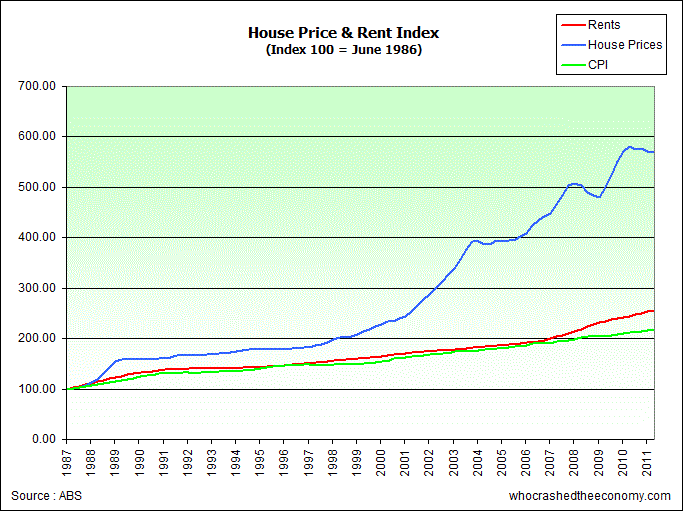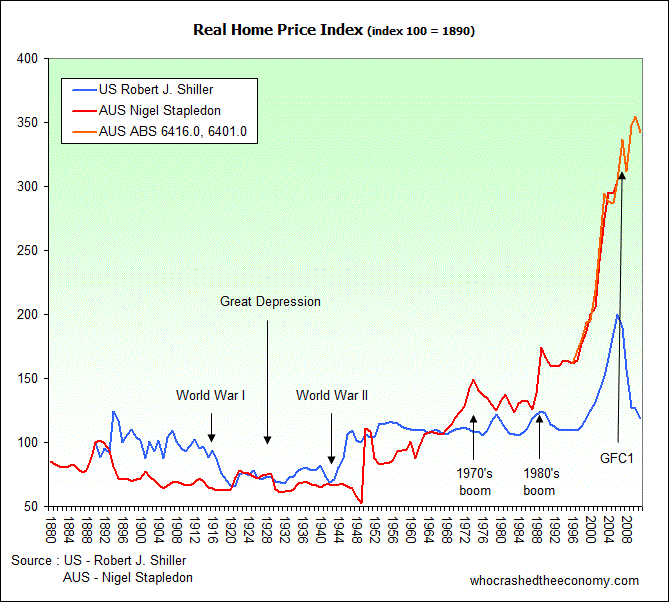Mortgage insurer Genworth Financial yesterday released its September Homebuyer Confidence Index showing the number of Australian’s with mortgage stress in Australia has jumped to 25 percent and is now at unprecedented heights, even exceeding levels experienced during the Global Financial Crisis.
With this in mind, is it better to rent or buy?
Earlier this week Sunrise asked the question of Chris Richardson from Deloitte Access Economics. Chris believes “housing prices had done so well for so long” and “given that the costs of buying a home has risen so much more than rents in the last decade or so, and, a really remarkable gap there” it is time to rent and put your money in other investments such as shares. When questioned if shares were volatile, he reminds viewers that like shares, property does go up and down over time.
After the segment, Mel reads out a quick tweet received – “Renting is buying, you are just buying it for the person on the mortgage.” On the flip side, the same could be said for buying, you are just renting it from the bank. If you default on payments, you can loose your home – You don’t own it until it’s fully paid off and the title is in your name.

For decades prior to the late 1990’s, house prices and rents tracked inflation. With cheap and easy credit in the early 2000’s house prices started to lift off, and as Chris rightly points out there is quite a remarkable gap between house price and rent inflation today (See chart above). Rents started to deviate away from inflation in 2007, but as rents are paid from wages and not borrowed (cheap and easy credit), there is little scope for rents to take off and are once again tracking inflation. According to Australians for Affordable Housing (AAH)’s spokesperson Sarah Toohey, some 740,000 renters have reported significant financial stress. If rents go up faster than wage inflation, renters will have no choice but to consolidate, leaving landlords with vacant premises and a vacancy rate trending skywards.
Chris is right to say that “housing prices had done so well for so long” as per the graph below. He is also right to say house prices can go down, as demonstrated in the United States (blue line).

According to RP data statistics, national house prices in Australia has been falling for 7 consecutive months. In some of the mining states, the falls are deeper and have been occurring for a longer period. Last month, Melbourne’s Herald Sun reported “Melbourne’s median house price has lost more than $800 a week since the property market peaked late last year.” $800 a week is a lot of rent money. Is it better if your speculating landlord loses it, than you?
But if it turns out Australia is not different and does follows in the footsteps of the rest of the world, then leveraging yourself into an asset bubble today could be financial suicide.
As Chris says there is “No need to rush from going from renting to buying.”
What is your opinion? Is it better to rent or buy in this market? If you are renting, are you saving the difference and if so, where have you parked your savings?
» Buy vs Rent – Which will make you richer? – Sunrise,
» Mortgage stress rises to all-time high – The Sydney Morning Herald, 22nd September 2011.
» Less Affordable Australian Housing: A Crisis – International Business Times, 19th September 2011.

Anyone saying “renting is buying” still has a few things to learn about opportunity cost 🙂
For someone with a natural inclination to invest any surplus cash, along with actual surplus cash to invest, then it’s not that hard to figure out:
1. How much am I paying in rent each week?
2. How much would it cost to buy a comparable house?
3. How do the annual costs (maintenance, rates, house insurance, etc) of owning that house stack up against the costs of renting it?
4. How much am I willing to pay for the intangible benefits of ownership? (such as the freedom to make minor modifications, like putting up some shelves or pictures, without needing permission from anyone else)
I know for the place I’m renting, the owner’s *gross* yield is at best 5 percent. Their net yield is going to be significantly lower than that. By buying the place, I’d be saving the difference between the rent payments and the annual cost of ownership, but I’d be shelling out substantially more to the bank in interest payments on the loan I’d need. That’s a terrible deal from a financial point of view when you have places like NAB’s UBank offering 6.5% gross interest on internet-only accounts where the cash can be reliably accessed within 2 business days. The returns available in the stock market are even better (but it takes a lot more effort to find a way of getting involved in that which is actually likely to be better than one of those internet-only high interest accounts).
My own investments are a mixture of ordinary stocks, exchange traded funds, mutual funds and high interest cash accounts and I cut down the rent bill even further by sharing a place with a couple of mates that I get on well with.
Where I can see buying making some sense (even in a bubbly market) is with folks with high disposable incomes that aren’t good at saving, but are extremely diligent at repaying debts. For them, the choice isn’t between “buy a house” and “invest in something else”, it’s between “buy a house and start paying back the bank” and “rent and fritter away the difference”. They’ll likely enjoy themselves quite a bit in the latter case, but they won’t be starting on the path to financial independence, either.
Agreed with Nick above. If you’re rational person and financially literate, it is no brainer case to choose renting compared to buying in current overvalued price level. Even if you don’t have to have mortgage and can buy and own outright using your own hard-earned cash, it is still questionable whether you want to spend too much for buying a home. I guess people in general are irrational and more so if we talk about housing – don’t know why but you would be perplexed seeing Australian people would try to find better value by bargaining, looking for discount and internet shopping for their small spending items like books, holidays, clothing, etc but don’t care to spend too much of their hard-earned incomes to buy one of the biggest spend item in their life i.e. housing.
The case is even worse if you have to slave-away for the next 10-25 years paying your mortgage, having sub-optimal lifestyle just to pay your “rent” to the bank. As mentioned in the article, you’re actually renting from the bank up to the point when you actually pay-off the whole mortgage balance. The risk of getting laid-off and not be able to pay your mortgage is real and present now with a second start of global recession.
I choose renting and investing the cost difference like Nick in high-interest saving account, shares (especially now in bear market to get deep value shares) and gold coins. Probably it is in my nature that is always try to find a bargain like I just switch my electricity provider because I can save $50 / year and also switch my car insurance to save $600 / year and of course by nature I find it incomprehensible to buy residential property right now when you can find better bargain by renting.
Yoda live on his yacht, rents marina berth. Can sail away if sh*t hits the fan at will.
Have rented since June 2009 when sold home to a greater fool (there were plenty back then)
Will continue to rent until house price reflect its value, not its inflated, stimulated, granted bidded up valuation from a credit boom.
Now its a credit contraction causing a depression resulting in deflation in asset prices now, so why buy?
Yoda say – Rent until the banks are flogging off their mortgagee houses away. Then buy 10.
My wife and I didn’t buy when we arrived back in Oz at the start of 2008 because we thought housing was in a speculative bubble. We still do think that. We’ve saved probably $100K over that period, plus put some of the savings we already had into investments and term deposits. I can’t begin to count how far ahead we are compared to buying. We’re wagering in 2-3 years we’ll be even further ahead.
Hi Yoda – it’s a completely different lifestyle isn’t it!! Done that in the past (UK – Camper & Nicholson Marina, Gosport, Hampshire; lived aboard a Beneteau 56 twin mast with 2 x the space of our present two-storey rental!!)
There aren’t many “homes” where you can up anchor and nip across the Channel to Calais, or have a month away cruising the Med, whilst STILL enjoying ALL the benefits of “home”.
Even at the presumed “Property doubles every seven years”, the initial capital commit is always significant, and say over a 21 year term, that’s only an 8-fold increase in the initial investment. Many non-property, broadly comparable long term investments offer a CONSIDERABLY higher degree of capital amplification, especially those where your money is NOT accessable until the term completes. Many Agribusiness packages have offered up to 1000 fold amplification, AND the added advantages of Carbon Credits and other Government “assistance”.
Looks like a few Aussies are going to be waking up to the reality of “you don’t get rich by following what everyone else is doing!”